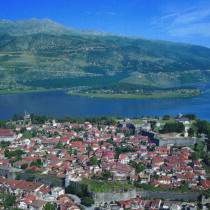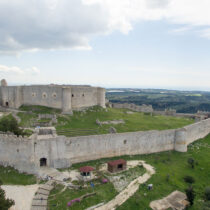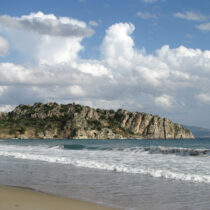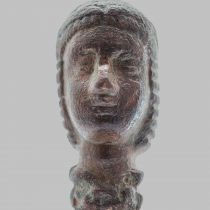Landscapes and the Augustan Revolution
This session will focus on the contributions that both landscape studies and landscape archaeology have on the understanding of wider processes developing in the western provinces of the Roman Empire.
Immediate rescue measures for the Agrippa monument
An inspection on the Acropolis was carried out yesterday morning by Minister of Culture and Sports Lina Mendoni.
Work at National Art Gallery almost complete
The project’s timetable as set in July 2019, has been kept to despite any sudden problems that have occurred, said Lina Mendoni.
Anniversary exhibition: 1821 before and after
One thousand and two hundred objects will unfold more than 100 years of history (1770-1870) over 2,500 square metres for 8 months (March to November 2021).
Mass extinctions of land-dwelling animals occur in 27-million-year cycle
Researchers find that timing of mass extinctions lines up with asteroid impacts and massive volcanic eruptions.
A violent death in the Cova Foradada about 5,000 Years Ago
An individual of about 50 years of age, who died violently from the impact of a stone adze, a type of hoe, about 5000 years ago.
Missing 5,000-year-old piece of Great Pyramid puzzle discovered
A 'chance discovery' at the University of Aberdeen could shed new light on the Great Pyramid with museum staff uncovering a 'lost' artefact — one of only three objects ever recovered from inside the Wonder of the Ancient World.
Study tracks elephant tusks from 16th century shipwreck
The Portuguese trading vessel sank off the coast of Africa, and scientists say they now have determined the source of much of the ivory recovered from the ship.
Evidence of oldest gynaecological treatment on record
Scientists are studying the physical evidence found in the mummified remains of a woman who suffered severe trauma to the pelvis in 1878–1797 BC.
Two permanent Assistant Professor posts
The Department of Classics and Ancient History at Durham University is advertising two permanent Assistant Professor posts in Greek History and Roman History, starting on 1 September 2021.
Non-destructive method for Ancient Egyptian embalming materials analysis
Researchers reporting in ACS' Analytical Chemistry have found a non-destructive way to analyze bitumen — the compound that gives mummies their dark color.
First prize for the Underwater Museum of Peristera
In the category “Innovation and Digitalisation in Sustainable Cultural Tourism, towards Smart Destinations” of the European Cultural Tourism Network ECTN.
Greek Archaeologists: the ICOMOS resolution cannot be undermined
The opinion of the ICOMOS International Assembly is of paramount importance to all experts on monuments.
Climate change caused the demise of Central Asia’s river civilizations
A new study challenges the long-held view that the destruction of Central Asia's medieval river civilizations was a direct result of the Mongol invasion in the early 13th century CE.
Mummified baboons shine new light on the lost land of Punt
Stable isotopes confirm long-distance seafaring during the 2nd Millennium BC.
Ancient DNA continues to rewrite corn’s 9,000-year society-shaping history
Three 2,000-year-old cobs in Honduras show that people brought corn varieties back to Mesoamerica, possibly sparking productivity and shaping civilization.
New evidence: Neandertals buried their dead
Team has demonstrated that a Neandertal child was buried, probably around 41,000 years ago, at the Ferrassie site (Dordogne).
“Birthday” of the roof of the world recalibrated
A recent study published in Science Advances proves, through fossil analysis, that much of the Third Pole only grew to its modern height over the past 10 million to 20 million years, rather than 40 million years ago.
Postdoctoral researcher in ancient Greek and Near Eastern narrative
Job vacancy: fully-funded Postdoctoral Research Fellowship in late antique and/or medieval Greek and Near Eastern narrative (2 years) at Ghent University (Belgium) (deadline: 5 January 2021).
Results of the recent excavations at Hala Sultan Tekke
The nature of the finds reflects the central role of Hala Sultan Tekke as a trading metropolis in the Mediterranean economic system.
An impressive fossilized tree with its branches was discovered
The fossilized trunk is preserved almost intact in a bed of fine-grained volcanic ash.
Archaeologists find Britain’s only 5th c. Roman mosaic
Archaeologists conducting excavations at Chedworth Roman Villa in Gloucestershire, England, have discovered the first known Roman mosaic that dates from the 5th century AD.
Pterosaur precursors fills a gap in early evolutionary history
Here's the original story of flight. Sorry, Wright Brothers, but this story began way before your time — during the Age of the Dinosaurs.
Mind-altering psychedelics discovered in Native American Cave
Archaeologists conducting a study of California’s Pinwheel Cave, a Native American rock art site associated with the Chumash people, have discovered evidence of mind-altering psychedelics.




























